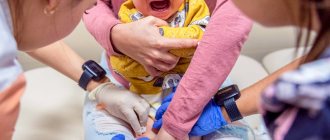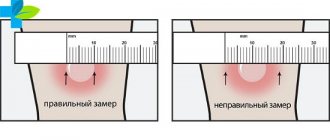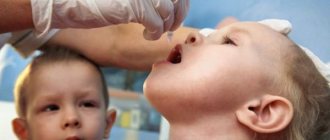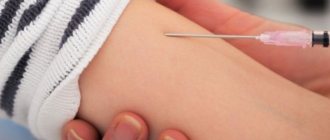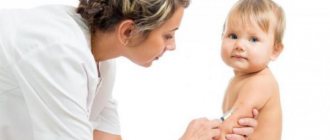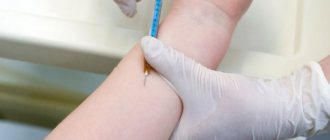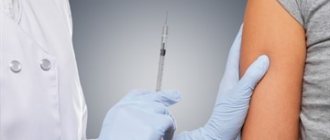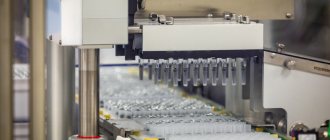Mantoux test
Sanitary and epidemiological rules SP 3.1.1295-03 “Prevention of tuberculosis”, section V:
5.1. For the purpose of early detection of tuberculosis in children, tuberculin diagnostics are carried out on children vaccinated against tuberculosis from 12 months of age until they reach the age of 18 years. An intradermal allergy test with tuberculin (hereinafter referred to as the Mantoux test) is performed once a year, regardless of the result of previous tests.
5.2. The Mantoux test is performed 2 times a year:
- children not vaccinated against tuberculosis due to medical contraindications, as well as not vaccinated against tuberculosis due to parents’ refusal to immunize the child, before the child receives vaccination against tuberculosis;
- children with chronic nonspecific diseases of the respiratory system, gastrointestinal tract, diabetes mellitus;
- children receiving corticosteroid, radiation and cytostatic therapy;
- HIV-infected children.
5.4. It is not allowed to carry out the Mantoux test at home, as well as in children's and adolescent organizations during the quarantine period for infectious diseases. Mantoux tests are performed before preventive vaccinations.
5.5. The interval between preventive vaccination, biological diagnostic test and Mantoux test should be at least one month.
5.6. Within 6 days from the moment the Mantoux test is performed, the following categories of children are sent for consultation to the tuberculosis dispensary at their place of residence:
- with a newly detected positive reaction (papule 5 mm or more), not associated with previous immunization against tuberculosis;
— with a long-lasting (4 years) reaction (with an infiltrate of 12 mm or more);
- with increasing sensitivity to tuberculin in tuberculin-positive children - an increase in infiltrate by 6 mm or more;
- an increase of less than 6 mm, but with the formation of an infiltrate measuring 12 mm or more;
- with a hyperreaction to tuberculin - infiltrate 17 mm or more;
- with vesiculo-necrotic reaction and lymphangitis.
5.7. Children sent for consultation to a tuberculosis dispensary, whose parents or legal representatives have not submitted a phthisiatrician's conclusion about the absence of tuberculosis within 1 month from the date of the Mantoux test, are not allowed into children's organizations.
Children who have not undergone tuberculin diagnostics are admitted to the children's organization if they have a phthisiatrician's conclusion that they do not have the disease.
Side effects after the reaction
After the Mantoux reaction, 1-2 days later the child may experience a number of side symptoms:
- Fever;
- Loss of appetite;
- Headache;
- General weakness, apathy;
- The appearance of skin manifestations (slight redness).
The appearance of these symptoms is usually associated with the child’s body’s reaction to the introduction of an aggressive allergen - tuberculin. In response to this, the immune system is activated, which leads to such consequences. If the child is healthy, they are usually mild and disappear quickly even before the test result is assessed.
After administration of the drug, as with DPT, there usually remains an injection mark on the skin. Of course, there may be no traces left, but in most cases the injection site is still noticeable. If the needle was inserted incorrectly or the child’s skin is very sensitive, a hematoma may later form at this site - a small bruise after Mantoux in the child. The occurrence of a hematoma is due to the fact that the tissues are injured by the syringe needle.
Bruises at the injection site are not a pathological symptom. However, sometimes the doctor may mistake it for a positive reaction, so if a bruise appears in the injection area, it is better to repeat the test.
Dangerous consequences
A component of alcohol is ethanol, which destroys the defense mechanisms in the human body. It impairs the performance of the endocrine system, central nervous system, liver and kidneys.
After drinking alcohol, the liver begins to cleanse the body of ethanol, whereas during the administration of a medication, all organs should work as usual. In patients who abuse alcohol, the immune system may not respond to the vaccine administered at all, or may cause an autoimmune reaction.
In patients who abuse alcohol, the immune system may not respond to the vaccine given
Even a small dose of alcohol can seriously affect the body as a whole. First of all, ethanol affects the neurons of the brain, dilates blood vessels, as a result of which the drinker feels euphoria and relaxation. Continued consumption of alcoholic beverages leads to intoxication, which adversely affects the performance of internal organs and the nervous system. And if we add to all this vaccination, which already weakens the body, then the consequences of such a cocktail will have a detrimental effect.
Alcohol, suppressing various functions of the body, changes the direction of enzyme activity, has an effect on microsomal enzymes of drugs and medications, as a result of which their effect on humans changes. The body's reaction to a combination of potent drugs and alcoholic beverages can be varied and unpredictable; it mainly depends on the individual characteristics of the patient.
In addition to the ban on alcohol, after vaccination against ticks, doctors recommend following a number of rules due to weakened immunity after the introduction of the vaccine:
- after the procedure, you need to sit for half an hour in a medical facility; if an allergic reaction occurs, the staff will be able to provide emergency assistance;
- after vaccination, do not overload the body with heavy fatty foods for two weeks;
- get more rest, avoid excessive physical activity and stressful situations;
- do not overcool or overheat;
- The injection site must be protected from water for 2-3 days, otherwise itching and redness may occur;
- Do not scratch the injection site for several days, even if itching occurs; there is a risk of infection;
- It is forbidden to take a shower, visit a sauna, or swim in reservoirs in nature for 2-3 days.
After vaccination, you should not get too cold.
Alcoholic drinks reduce the immune system, making it vulnerable to infections, and complicating post-vaccination syndrome. Many people believe that a small proportion of intoxicating drinks will not cause much damage, but a large dose can cause irreparable harm. But drunkenness in any of its manifestations has a detrimental effect on a person’s overall well-being. Note that it is not advisable to drink low-alcohol cocktails, since ethanol is also present in their composition.
The possibility of getting encephalitis, which some people fear, is excluded, but getting a bunch of complications is still not excluded. Interfering with the body's performance by consuming alcoholic beverages entails serious consequences. No medical specialist can accurately predict what complications will arise from combining alcohol and vaccines.
What does nicotine do to our body?
Nicotine is a powerful poison; it destroys the ciliated epithelium that lines the bronchi.
Nicotine disrupts the removal of pathogenic microorganisms from the respiratory system, they accumulate and create foci of inflammation. Against this background, bronchitis, tuberculosis and other serious diseases can develop.
Nicotine is 3 times more toxic than arsenic! The tars contained in tobacco consist of volatile compounds that settle on the respiratory system and disrupt the functioning of the pulmonary parenchyma and immune defense.
Alcohol before and after testing for tuberculosis
People often ask whether it is possible to drink intoxicating drinks before an injection. Doctors advise avoiding this, but the ban is not as serious as after introduction. A person can drink and smoke. Drinks that were drunk before the injection do not affect his reaction. So if you want to drink a little, it is better to do this before introducing the bacilli.
As soon as the patient has had the test, the question immediately arises in his head: when can he drink alcohol after the Mantoux vaccination? As we have already found out, you should not do this immediately after the injection. You must wait until the doctor examines the result. Generally it takes 72 hours. And then, this is only if the result is negative. If the body’s positive response to the test appears, then this action will need to wait some more time.
INTERESTING fact: Is it possible to drink Amiksin with alcohol?
In addition, at first it is not recommended to go all out and drink a large number of drinks. It is necessary to gradually increase the dose. Everything should be in moderation.
Remember that by restraining yourself from such a manifestation, you can protect yourself from a possible false manifestation of the Mantoux reaction. If you have a constant need for alcohol, then use the help of specialists. The most important thing is to gather all your will into a fist and believe in your strength.
Be healthy!
Attention!
Tuberculosis and smoking are incompatible, since harmful substances from cigarettes irritate the mucous membrane of the lungs, inhibit immunity (including cellular immunity) and the body’s defense mechanisms.
This must always be remembered, because every person wants to live a long, happy life full of pleasant impressions.
No cigarettes can replace the joy of a healthy life!
Besides the fact that cigarettes carry the most dangerous and intractable diseases, they add neither beauty nor meaning.
Hyperergic reaction
The hyperergic reaction that occurs in children after Mantoux deserves special attention. It is characterized by a significant increase in the child’s body temperature and the occurrence of skin manifestations. These include:
- The hand itches in the injection area;
- The formation of large papules after Mantoux (more than 1.5 centimeters);
- The appearance of bubbles filled with liquid - vesicles;
- Skin rash on the arm with severe redness.
Such an enhanced Mantoux test with the appearance of a rash can occur both in the presence of an active tuberculosis process in the body, and in cases of increased sensitivity of the immune system to allergic components.
If a hyperergic reaction is detected after Mantoux in children, it is necessary to undergo a full examination. If you have been referred to a consultation with a TB specialist, be sure to go. His examination includes a repeated Mantoux or Diaskintest test for tuberculosis, as well as chest x-ray to visualize the tuberculosis process in the lungs. The possible consequences of not diagnosing tuberculosis in time are very dangerous, so it is necessary to undergo a timely examination.

